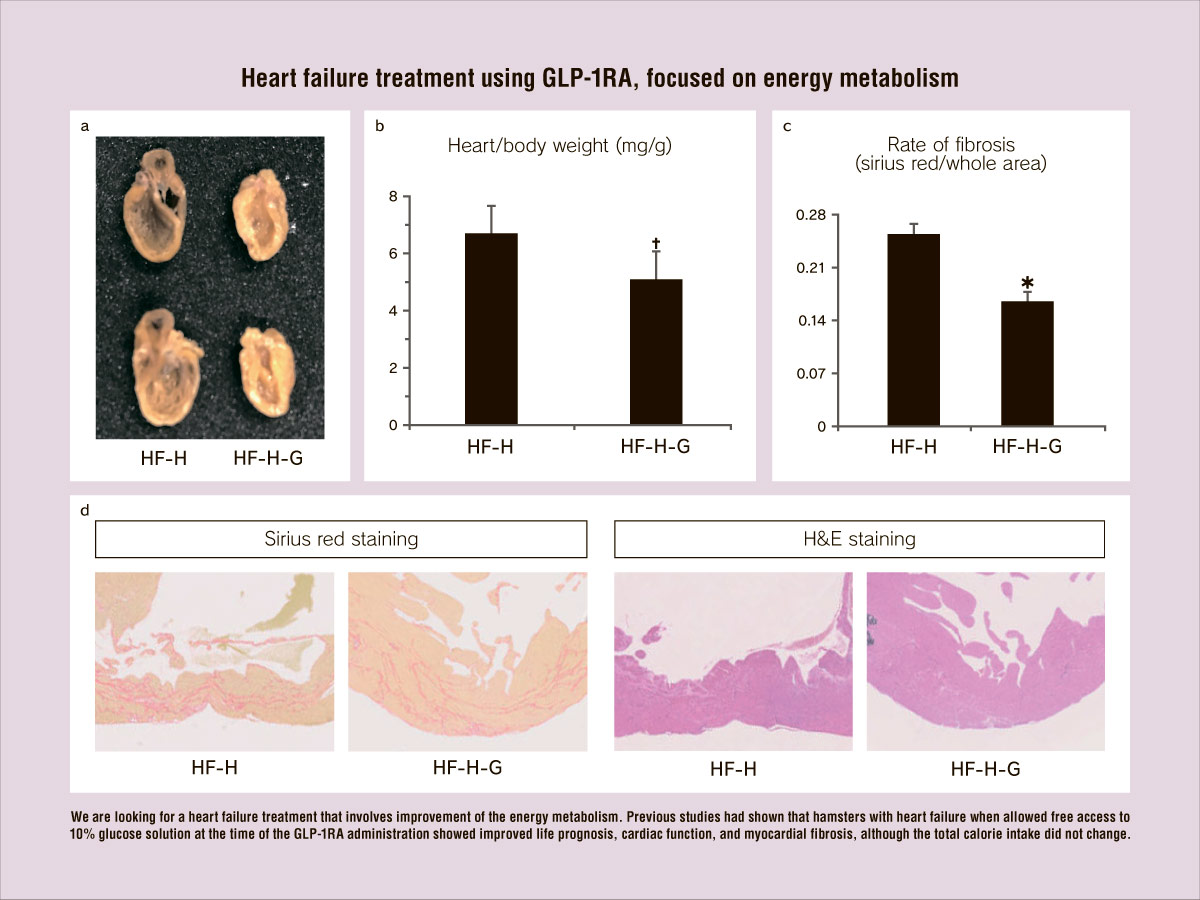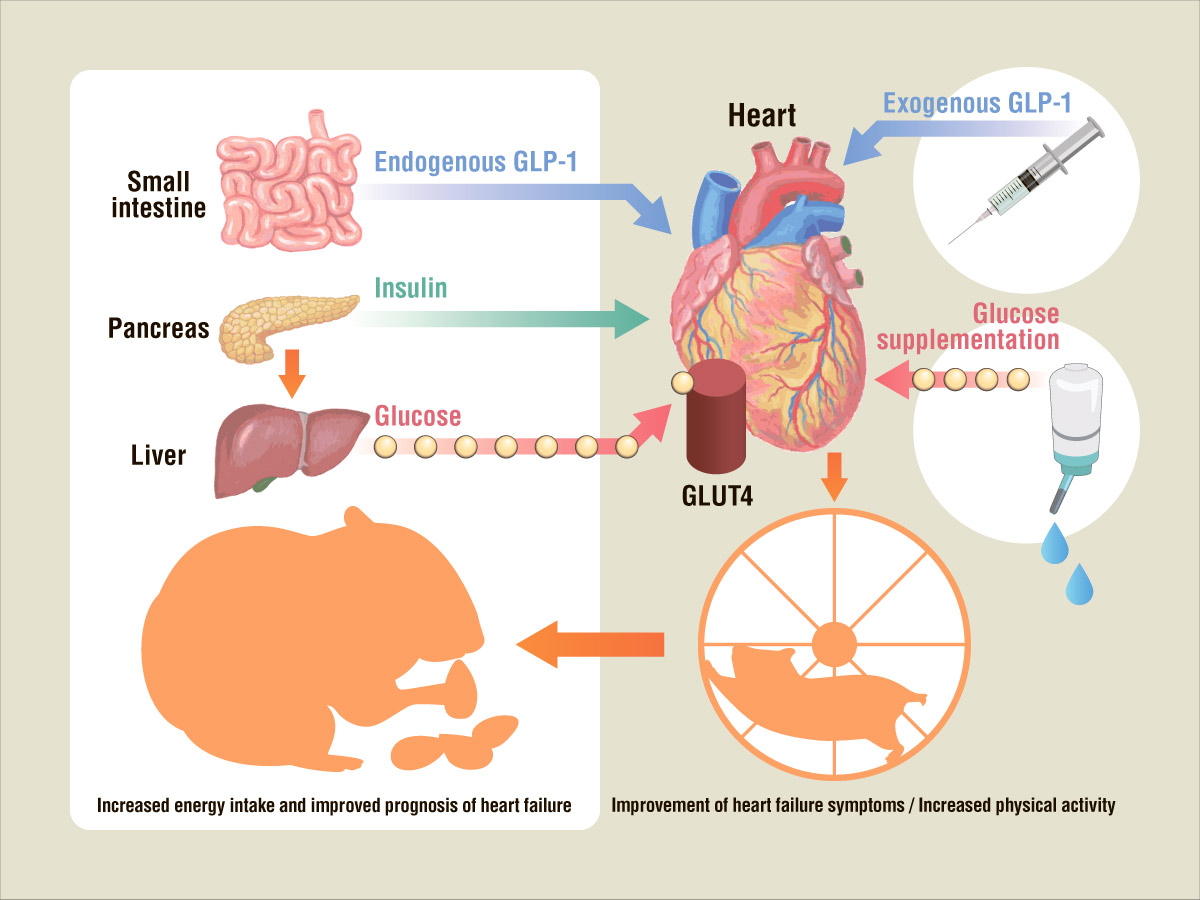Elucidation of the pathophysiological mechanism of cardiovascular diseases and approach to their treatment

Research Fields
Cardiology, heart failure, hypertension, arteriosclerosis, vaccine development
Keywords
Heart failure animal model, myocardial infarction animal model, mitochondria, myocardial metabolism, hypertension, oxidative stress, EETs, vascular endothelial cells
Research overview
Exploration of novel treatments for cardiovascular diseases that increase healthy life expectancy also Research to find better treatments
Heart failure is expected to become a pandemic in the future due to an increase in the number of survivors of acute cardiovascular diseases (people who have been or are being treated) and an increasingly aging society. Under such circumstances, we are continuing our research on elucidating the pathological mechanism of cardiovascular diseases and approaches to treatment, aiming for a future where people can enjoy a long life by increasing the healthy lifespan as much as possible.
■ New approaches to treatment of heart failure
While treatment with drugs such as RA inhibitors, β-blockers and MRA, and cardiac resynchronization therapy have been established as treatments for heart failure, we believe that changes in cardiac energy metabolism and nutritional status are the causes of heart failure and therefore could provide clues to the solution. Using an animal model of non-diabetic dilated cardiomyopathy, we conducted research by measuring metabolism by indirect calorimetry using the ARCO2000 system and measuring mitochondrial function using Oxygraph-2k. As a result, it could be demonstrated that GLP-1RA causes myocardial energy deficiency in heart failure, and that an appropriate intake of carbohydrates while receiving GLP-1RA dramatically improved heart failure outcomes. The results of this research were obtained using a different approach from the treatment methods that are focused on cytokine factors, and I think that eventually this new method will lead to effective treatments for heart failure. The research was evaluated highly, and I received the highest award for female researcher encouragement of the Japanese Circulation Society at the Kyushu Regional Association meeting in December 2020.
■ Development of vaccine treatments for cardiovascular diseases
As a new treatment for cardiovascular diseases, we have been conducting research on increasing EETs in the body through the use of an sEH inhibiting vaccine, and we are proceeding with the research with a view to applying it to humans in the near future. By inoculating with this vaccine, a simple and inexpensive long-term therapeutic effect on chronic heart failure, suppression of remodeling after myocardial infarction, arteriosclerosis, etc. can be expected.
Although treatments for cardiovascular diseases have evolved rapidly over the last 20 years or so, it is clear that the heart is damaged due to the disease and the incidence of diseases with a poor prognosis is still on the increase. We are working constantly with the hope that our research would lead to novel treatments.
*At Saga University, we adhere to the 3Rs of animal research while doing experiments with animals.
Message
Heart failure is expected to become pandemic due to an increase in the number of survivors of acute cardiovascular diseases, an aging society, etc. We are conducting research aiming for a future where people can enjoy a long life by increasing the healthy lifespan as much as possible. The heart is an organ that is essential for delivering nutrients and oxygen to the entire body. It is therefore a special organ that beats regularly throughout life without one being aware of it. Due to this special nature, it always requires a great deal of energy. Suspecting that this was one of the causes of heart failure and a clue for its solution, we are focusing our research on mitochondrial function and cardiac metabolism of sugars and lipids.
The anti-s EH vaccine has the effect of increasing EETs in the body. We are pursuing our research under the hypothesis that this vaccine would be effective against cytotoxic pathologies. Currently, the vaccination is given only to animals, but we are also considering applying it to humans in the near future.
Main publications
- Shiraki A, Oyama JI, Nishikido T, Node K. GLP-1 analog liraglutide-induced cardiac dysfunction due to energetic starvation in heart failure with non-diabetic dilated cardiomyopathy. Cardiovasc Diabetol. 2019;18(1):164.
- Nishikido T, Oyama JI, Shiraki A, Tsukamoto I, Igarashi J, Node K. COA-Cl (2-Cl-C.OXT-A) can promote coronary collateral development following acute myocardial infarction in mice. Sci Rep. 2019;9(1):2533
- Komoda H, Shiraki A, Oyama JI, Nishikido T, Node K. Azelnidipine Inhibits the Differentiation and Activation of THP-1 Macrophages through the L-Type Calcium Channel. J Atheroscler Thromb. 2018;25(8):690-697.
- Oyama JI, Shiraki A, Nishikido T, Maeda T, Komoda H, Shimizu T, Makino N, Node K. EGCG, a green tea catechin, attenuates the progression of heart failure induced by the heart/muscle-specific deletion of MnSOD in mice. J Cardiol. 69(2):417-427.
- Nishikido T, Oyama J, Shiraki A, Komoda H, Node K. Deletion of Apoptosis Inhibitor of Macrophage (AIM)/CD5L Attenuates the Inflammatory Response and Infarct Size in Acute Myocardial Infarction. J Am Heart Assoc. 5(4):e002863.






